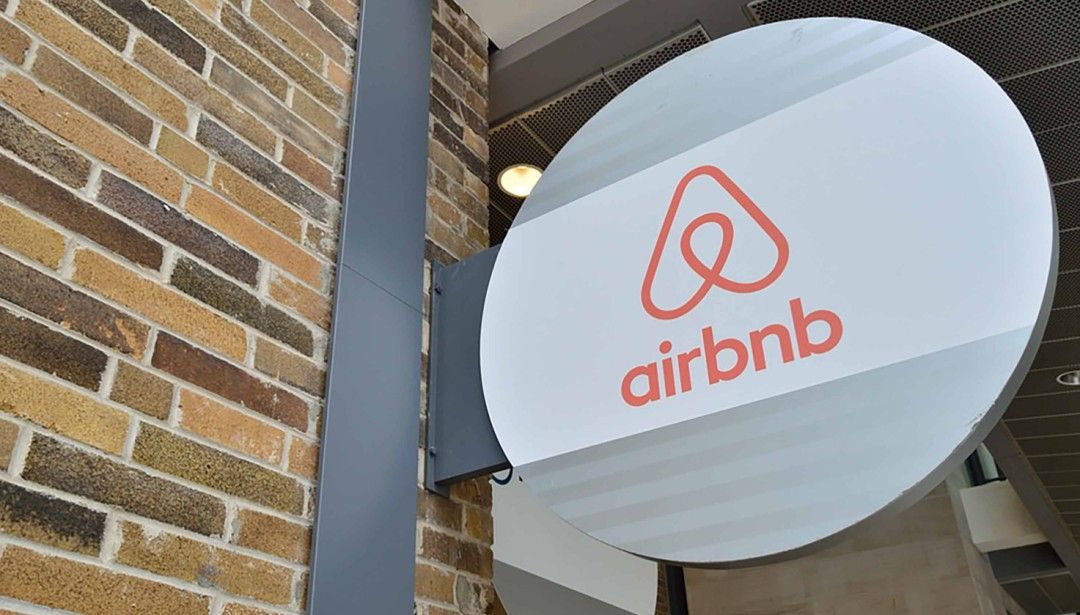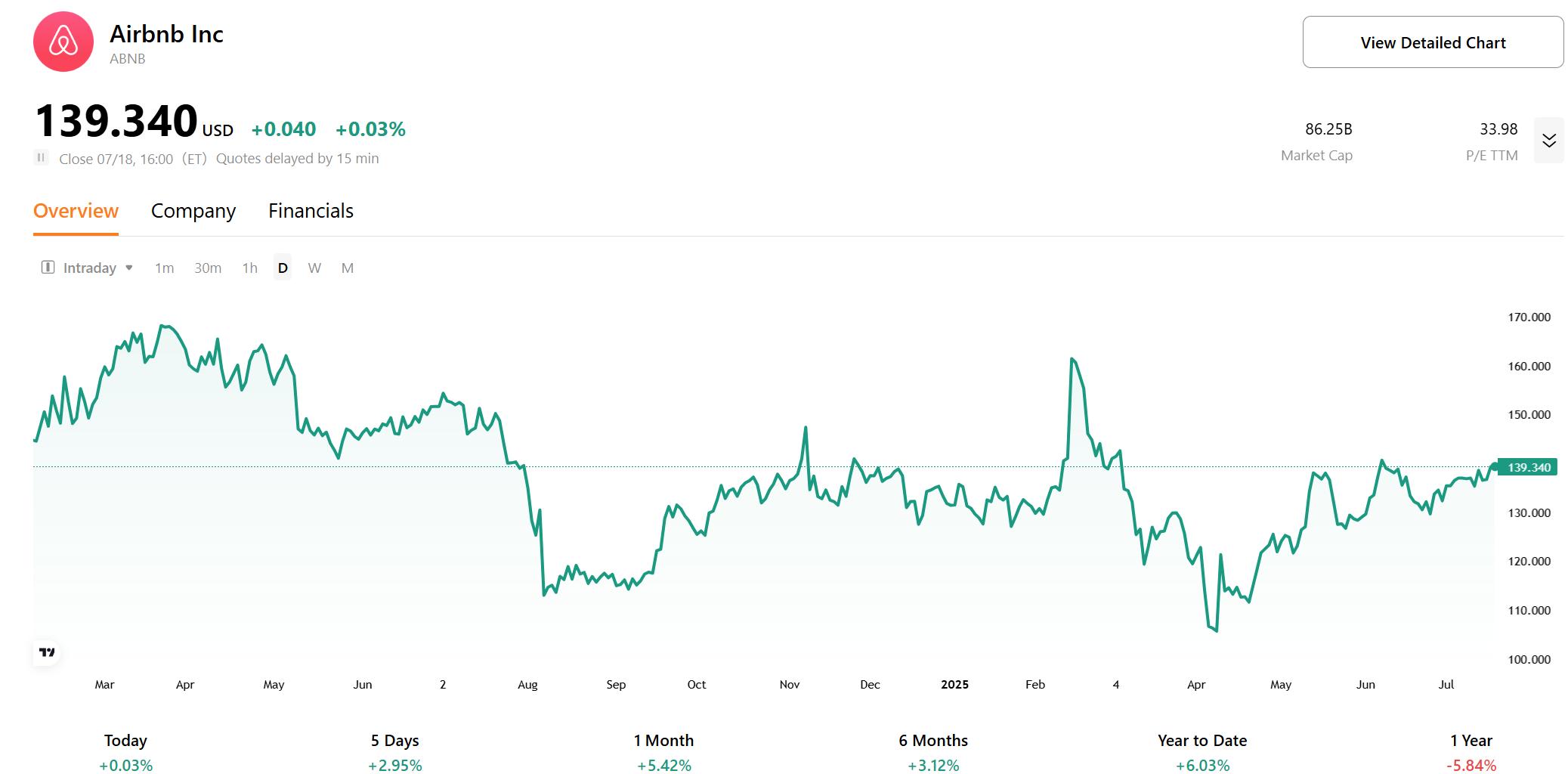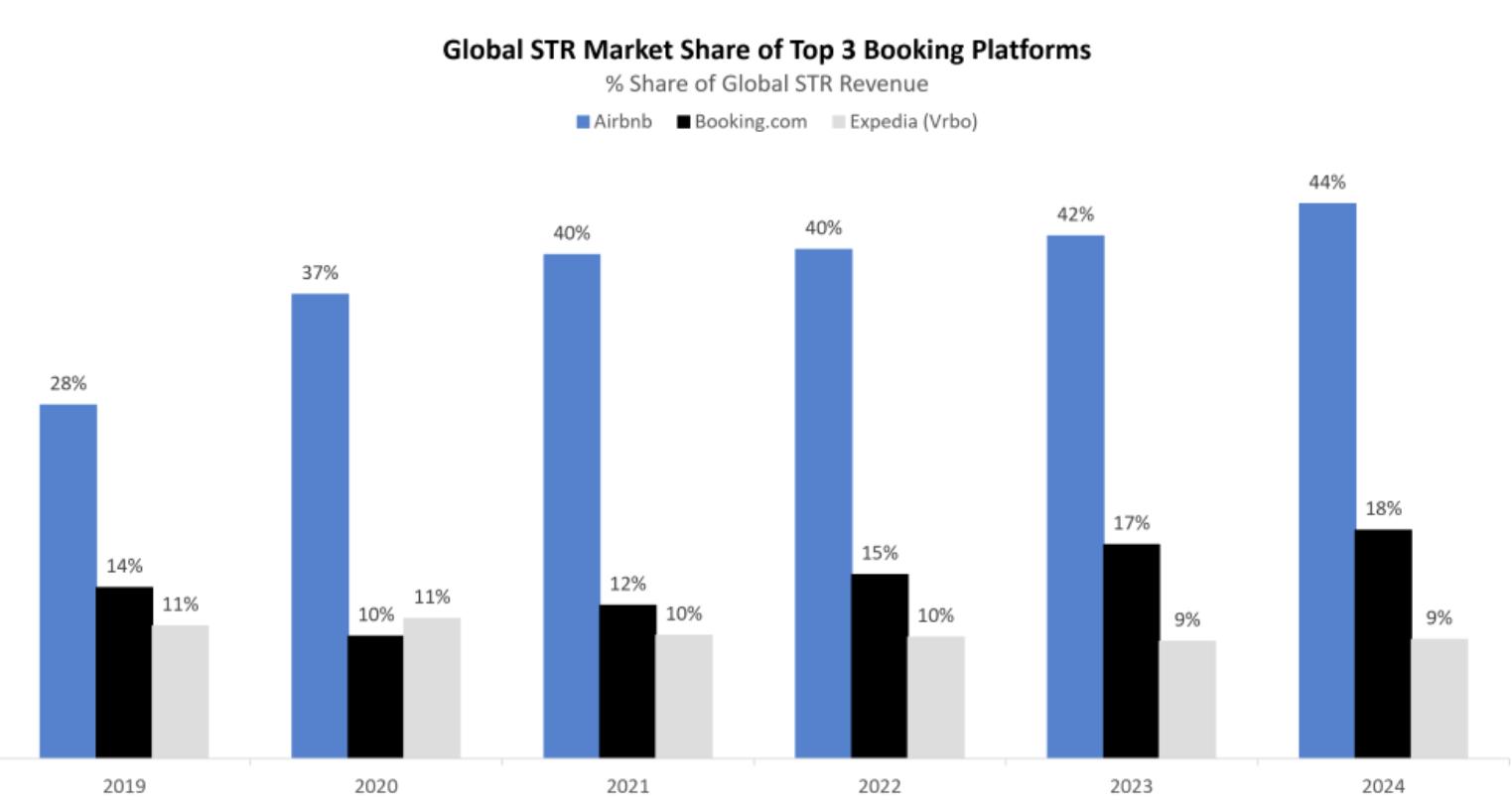From Treehouses to Castles: How Airbnb Is Disrupting the Traditional Travel Market

Investment Thesis
TradingKey - Airbnb, as the global leader in the short-term rental market, leverages diverse listings, Remote Work Hubs, and Airbnb Experiences to effectively capture post-pandemic demand for flexible accommodations and personalized travel, achieving a 44% market share in 2024, far ahead of competitors. The company’s robust revenue model, driven by service fees, and its expansion into emerging markets demonstrate strong growth potential. Based on DCF valuation, the target stock price ranges from $126.86 to $132.08, reflecting its competitive strengths. However, risks such as regulatory restrictions, competitive pressures, and economic downturns warrant caution. Macroeconomic resilience and a supportive financial environment provide favorable conditions, positioning Airbnb as a top investment choice in the short-term rental industry.

Source: TradingKey

Source: Airbnb, TradingKey
Company Overview
Airbnb, Inc., founded in 2008, is a U.S.-based company operating a leading global online marketplace platform that offers short- and long-term homestay rentals, unique experiences, and related services. As an intermediary platform, Airbnb connects hosts with travelers, meeting diverse accommodation needs from apartments to castles without owning any properties, earning commissions on each booking. Covering over 200 countries with more than 8 million active listings, it serves approximately 200 million users. With its flexibility and personalized options, Airbnb disrupts the traditional hotel industry. Continuously innovating to meet global traveler demands while empowering hosts to generate income, Airbnb remains the leader in the short-term rental market.
Competitor Analysis
Airbnb operates in the highly competitive online travel and accommodation industry, facing major competitors such as Booking.com, Expedia, Vrbo, and TripAdvisor Rentals. Each competitor has distinct strengths: Booking.com excels in traditional hotel bookings and car rentals, Expedia offers comprehensive travel services from flights to accommodations, Vrbo focuses on whole-home rentals for families and groups, and TripAdvisor Rentals leverages its robust user review system to attract customers.
.jpg)
Source: Company Reports, TradingKey
Unlike traditional competitors, Airbnb has carved a unique path in the online travel and accommodation industry, focusing on the short-term rental market and gaining renown for offering diverse, personalized accommodation experiences. Beyond conventional hotels and resorts, Airbnb’s listings include a wide variety of unique options such as treehouses, houseboats, and castles, catering to needs ranging from urban apartments to rural cottages and from budget to luxury. This differentiated strategy not only attracts consumers seeking distinctive travel experiences but also helps Airbnb stand out in a competitive landscape. Whether for budget-conscious backpackers or high-end travelers seeking luxury, Airbnb provides tailored solutions.
In recent years, the short-term rental industry has grown rapidly due to surging consumer demand for flexible, personalized travel experiences. According to Skift Research, the global short-term rental market reached a value of $183 billion by 2024, dominated by key players such as Airbnb, Booking.com, Expedia/Vrbo, and TripAdvisor Rentals. Airbnb leads the industry with a 44% market share, significantly ahead of Booking.com (18%) and Expedia/Vrbo (9%). Together, these three platforms account for 71% of the market, with the remaining 29% split among smaller platforms and direct bookings. Notably, Airbnb’s market performance has been particularly impressive. During the post-pandemic recovery, its global market share surged from 28% in 2019 to 44% in 2024, demonstrating strong growth momentum. This data not only underscores Airbnb’s leadership in the short-term rental market but also highlights its ability to effectively capitalize on evolving consumer demands.

Source: Skift Research
To maintain and further expand its market share, Airbnb retains significant advantages in reaching more hosts and guests. Currently, Booking.com's marketing expenditure accounts for 37.3% of its total revenue, while Airbnb's marketing spend represents only 24% of its total revenue, indicating substantial room for increased investment in marketing. Meanwhile, Airbnb's robust financial position provides strong support. As of now, Airbnb's total debt stands at just $2.28 billion, with cash reserves reaching $11.5 billion and free cash flow at $4.4 billion. This solid balance sheet demonstrates that Airbnb has ample capacity to boost marketing investments, further strengthening its market position and attracting more potential guests and hosts.
Revenue Breakdown
Airbnb’s revenue primarily comes from its platform booking service fees, which consist of two components: an approximately 3% service fee charged to hosts and a guest service fee of up to 14.2%. According to Q1 2025 data, Airbnb generated total revenue of $2.27 billion, with North America contributing nearly 46% of the revenue share, followed by Europe, the Middle East, and Africa (EMEA) at 26%, Latin America at 15%, and the Asia-Pacific region at 12%. This regional distribution reflects Airbnb’s balanced presence in both mature and emerging markets.
Service fees form the core of Airbnb’s revenue, calculated based on the total transaction value of each booking, supporting key platform functions such as operations, payment processing, and customer support. Revenue growth in service fees is primarily driven by an increase in average daily rates (ADR), closely tied to steady growth in Gross Booking Value (GBV) and nights booked. However, Airbnb’s revenue exhibits clear seasonality. For instance, strong Q3 performance is driven by peak summer travel demand, while Q4 sees weaker results due to the off-season. Despite this, Airbnb has achieved consistent year-over-year revenue growth in recent quarters, highlighting its competitive advantage and sustained appeal in the holiday travel market.
By flexibly adjusting its take rate (the percentage of service fees relative to transaction value), Airbnb demonstrates its ability to balance revenue growth and market expansion in dynamic market conditions. For example, the take rate reached 18.5% in Q3 2024, reflecting a profit-maximization strategy during peak season, while it dropped to approximately 9.3% in Q1 2025, indicating a focus on stimulating bookings and strengthening the user base during the off-season. This differentiated pricing strategy not only enables Airbnb to effectively navigate seasonal fluctuations and competitive pressures but also lays a solid foundation for future global market expansion. By raising take rates during high-demand periods and lowering them during low-demand periods, Airbnb achieves the dual goals of revenue growth and user expansion.

Source: Airbnb, TradingKey

Source: Airbnb, TradingKey
Growth Potential
1. Macro Factors:
Airbnb’s revenue primarily comes from the U.S., making it highly sensitive to changes in the U.S. macroeconomic environment. On the supply side, economic fluctuations may reduce guests’ willingness to book and weaken hosts’ incentives to offer short-term rentals. For instance, during an economic downturn, hosts may prefer long-term rentals to secure stable income. According to the Atlanta Fed’s forecast, U.S. GDP growth for Q2 2025 is projected at 2.4%, indicating economic resilience compared to other major economies. A stronger economy typically encourages hosts to favor short-term rentals, increasing available listings and driving booking volume growth on Airbnb’s platform.
On the demand side, economic downturns, inflation, or rising unemployment could lead consumers to cut non-essential spending, particularly on leisure travel. As Airbnb’s user base is predominantly leisure travelers, its revenue is heavily tied to consumers’ disposable income, making it vulnerable during economic downturns. However, current U.S. economic data provides some support: core CPI rose by 0.2% month-over-month in June, marking five consecutive months of low growth; non-farm payrolls have remained stable between 140,000 and 260,000 year-to-date, with the unemployment rate holding steady at a low 4.1%. These figures suggest robust consumer spending power, corroborated by consumption growth data from JPMorgan and Bank of America. Resilient consumption growth and easing inflation reduce pressure on consumer spending, channeling more budgets toward non-essential items like travel.
Additionally, since Liberation Day on April 2, the financial environment has remained easing, with credit spreads at historic lows and a significant rebound in corporate borrowing demand and volume, supporting economic growth. The ongoing rate-cutting cycle and a more dovish Federal Reserve further boost asset prices. Additionally, a weaker U.S. dollar, driven by a dovish Fed, tariffs, and debt concerns, may enhance corporate reported revenues in the remaining quarters of 2025, as a weaker dollar increases the value of international revenues when converted to USD and may attract more international tourists to choose U.S. accommodations.
2. Market Expansion
Airbnb is accelerating its expansion in emerging markets, with a focus on Asia and Latin America. According to the Q1 2025 financial report, Latin America has become the fastest-growing region, with an 11% year-over-year increase in nights booked. This strong performance is primarily driven by the region’s steady economic recovery and sustained growth in tourism demand. Meanwhile, Airbnb is strategically targeting second- and third-tier cities and non-traditional travel destinations, where occupancy rates reach as high as 70%, indicating significant untapped market potential. The company’s management has announced plans to add 1 million new listings by the end of 2025, a key component of its strategy to deepen penetration in emerging markets.
3. Product Diversification
After the pandemic, the rise of remote work spurred demand for flexible accommodations. Airbnb quickly responded by introducing mid-to-long-term stay programs like Remote Work Hubs and expanding its property types to include vacation homes, unique spaces, B&Bs, and boutique hotels, while also entering the luxury market through Beyond by Airbnb. Concurrently, Airbnb launched Airbnb Experiences, encouraging hosts to offer localized travel experiences and services such as massages, private chef cooking, and cultural activities, generating additional income for hosts and boosting the platform’s appeal. These initiatives collectively drive Airbnb’s shift from a single accommodation platform to a comprehensive travel and lifestyle service platform. Looking ahead, Airbnb plans to introduce social features to further solidify its position in the travel ecosystem.
Valuation
Based on a three-year Discounted Cash Flow (DCF) model, Airbnb’s enterprise value (EV) is estimated at $78.528 billion to $81.758 billion, comprising a present value (PV) of $7.492 billion to $7.749 billion and a terminal value (TV) of $56.974 billion to $59.948 billion. The model assumes revenue growth rates of 6.42% to 8.29%, operating margins of 22.23% to 22.26%, and a discount rate based on U.S. Treasury yields of 3.84% to 4.20% plus a 2% premium. After subtracting net debt and dividing by 619 million outstanding shares, the target stock price range is $126.86 to $132.08. This valuation reflects Airbnb’s competitive advantage in the global short-term rental market.
Risk
· Legal and Regulatory Risks: Airbnb must comply with complex legal and regulatory requirements across different regions. Some cities impose restrictions or bans on short-term rentals, and hosts may face fines or litigation for non-compliance.
· Market Competition Risks: Airbnb faces competition from other short-term rental platforms and traditional hotels, requiring continuous innovation to maintain its market leadership.
· Economic Risks: Economic downturns may reduce Airbnb bookings, impacting revenue. However, consumers are likely to shift toward cost-effective mid-to-low-priced accommodations, increasing demand for these options and partially offsetting the impact. Additionally, travel demand in Europe and the Americas remains relatively resilient, with short-haul or budget-friendly trips continuing to support demand. Airbnb can mitigate risks by adjusting its property offerings to align with changing consumer preferences.
· Inflation Risks from Tariffs: The impact of tariffs on inflation has not yet been significant, primarily due to high corporate inventory levels and existing fixed-price contracts, which have temporarily restrained price increases. However, if tariff policies lead to an inflation rebound, consumers’ disposable income may decrease, potentially reducing travel budgets and affecting Airbnb’s demand.









